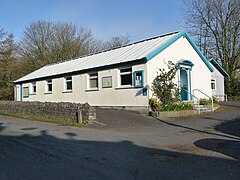Rimington
| Rimington | |
|---|---|
 The Memorial Institute, built 1927 |
|
| Rimington shown within Lancashire | |
| Population | 382 (2001 Census) |
| OS grid reference | SD806458 |
| Civil parish |
|
| District | |
| Shire county | |
| Region | |
| Country | England |
| Sovereign state | United Kingdom |
| Post town | CLITHEROE |
| Postcode district | BB7 |
| Dialling code | 01200 |
| Police | Lancashire |
| Fire | Lancashire |
| Ambulance | North West |
| EU Parliament | North West England |
| UK Parliament | |
Rimington is a rural village and civil parish in the Ribble Valley, Lancashire, England. The population of the civil parish was 382 at the 2001 Census, however at the 2011 Census Middop was included with Rimington giving a total of 480. It is east of Clitheroe and south of the A59 road. The village consists of the hamlets of Howgill, Martin Top, Newby and Stopper Lane, and was formerly in the West Riding of Yorkshire.
The parish adjoins the Ribble Valley parishes of Gisburn, Sawley, Downham, Twiston and Middop the Pendle parish of Barley-with-Wheatley Booth.
The village was listed in the Domesday Book as "Renistone". The name Boulton (Bolton) is listed in land deeds of 1302, and Robert Elwald son of Alan listed 1304.
Since Tudor times, until the late 19th century, lead mining was an important industry around the village. At one time silver was derived as a by-product of the mining, to the extent that Queen Elizabeth I declared the Stopper Lane Mine as being a Mine Royal.
Francis Duckworth (1862–1941) was born in the village, and composed several hymn tunes including one named after the village. There is a plaque to his memory was placed above the doorway to the former Methodist Chapel in Stopper Lane. Salem Chapel, the local Congregational Church at Martin Top, was founded in 1816 and continues to serve the area.
Rimington railway station opened in 1872 and closed in 1959, and was on the Ribble Valley Line.
...
Wikipedia

